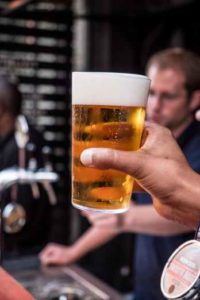
In American culture, few things are as quintessentially patriotic as politics and beer.
.From campaign tactics that leverage the casual ambiance of a local pub to branding decisions that reflect the tastes of working-class Americans, beer has often served as a symbolic touchstone in political campaigns, debates, and discussions about identity and representation.
Past Presidents And Beer
When George Washington was a colonel in the Virginia Militia, he wrote down a recipe for a “Small Beer” on a page of his military notebook and in 2018 Budweiser brewed a beer based on the that recipe.
When Thomas Jefferson left office and began his grand plans for Monticello, he designed and built a brewhouse on the property, as well as grew his own hops and barley to malt on site.
Our fourth president, James Madison, really loved beer. Madison wanted to create the National Beer Brewery in 1809 and appoint a Secretary of Beer to the cabinet, but was blocked by Congress.
Franklin Roosevelt ended prohibition in 1933 marking the day with a simple statement “I think this would be a good time for beer.”
Jimmy Carter goes down in beer history with the legalization of homebrewing again in 1979, and President Obama actually brewed a Honey Porter at the White House using honey from hive on the South Lawn.
Beer on the Campaign Trail
 Beer and American political campaigns share a rich historical past.
Beer and American political campaigns share a rich historical past.
In the early days of the republic, taverns were central hubs for political discourse. Politicians would often make appearances at these local watering holes to connect with voters.
And that tradition continues today, with political figures using breweries and bars as a backdrop for their campaigns. Beer has always been associated with” the people” and shrewd politicians used those appearances to appear relatable and down-to-earth.
One recent example is President Barack Obama, who famously visited the Iowa State Fair in 2012 to have a beer with patrons, a move that bolstered his image as an everyman. This year’s campaign appears to be a bit of a departure as both Donald Trump and Joe Biden don’t drink alcohol according to the Wall Street Journal, but trust us, their followers do.
The “Beer Test” as a Symbol of Political Relatability
The “beer test” has become a popular, if informal, metric in presidential elections. It refers to the idea that voters might choose a candidate they would prefer to have a beer with, indicating relatability and likability.
This concept gained traction during George W. Bush’s campaigns, (who ironically no longer drank any alcohol), where his persona as a regular guy who would be fun to have a beer was contrasted sharply with his opponent, Al Gore, who was often perceived as stiff and formal.
Beer and Policy
Beer issues such as taxation, regulation of breweries, and drinking age laws have all intersected with presidential politics over the years. And the craft beer boom has brought national attention to regulatory policies that affect small breweries, leading to discussions about tax breaks and reduced regulations to support this industry.
Moreover, presidential candidates have occasionally used beer-related policies to appeal to voters. The repeal of Prohibition was a huge voter aspect of Franklin D. Roosevelt’s campaign in 1932
Beer and Presidential Politics
The relationship between presidential politics and beer reflects broader cultural trends. Beer is more than a beverage; it is a social lubricant, a tradition, and a symbol of American ingenuity and entrepreneurship.
Whether through the “beer test,” policy initiatives, or historical connection between past Presidents, beer has remained an integral part of the political landscape and that relationship continues today.
###
 American Craft Beer The Best Craft Beer, Breweries, Bars, Brewpubs, Beer Stores, And Restaurants Serving Serious Beer.
American Craft Beer The Best Craft Beer, Breweries, Bars, Brewpubs, Beer Stores, And Restaurants Serving Serious Beer.
